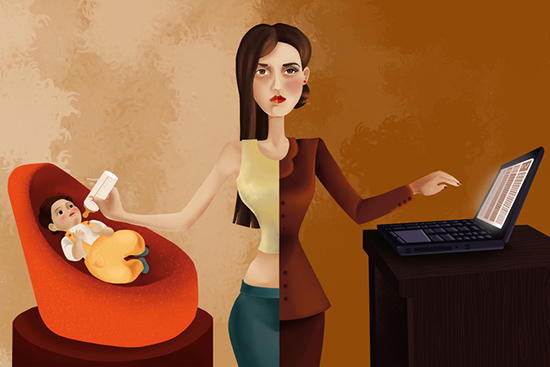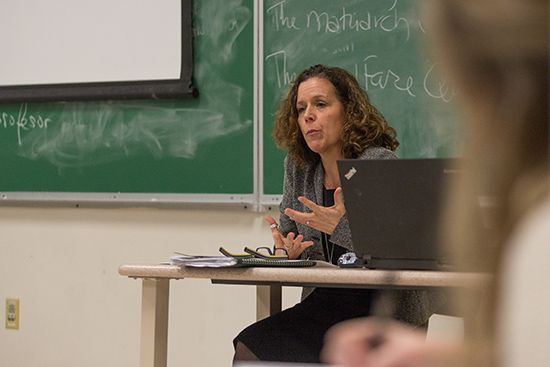One Class, One Day: Motherhood
CGS course probes economic realities, myths of working vs at-home mothering

What are the obvious—and not so obvious—economic costs of motherhood? That’s the question Lynn O’Brien Hallstein ponders in her class Cultural Constructions of Motherhood. Illustration by Fanatic Studios/Getty Images
Class by class, lecture by lecture, question asked by question answered, an education is built. This is one of a series of articles about visits to one class, on one day, in search of those building blocks at BU.
During a recent class for her Cultural Constructions of Motherhood course, Lynn O’Brien Hallstein kicks off a discussion of motherhood’s economic costs with a reference to feminist Simone de Beauvoir, who wrote, “No woman should be authorized to stay at home to bring up her children…because if there is such a choice, too many women will make that one. It is a way of forcing women in a certain direction.” Of course, most women today, from Marissa Mayer, the famously back-to-work-with-an-infant president and CEO of Yahoo, to a minimum-wage cashier at Stop & Shop, would not agree with the belief held by de Beauvoir, who died in 1986, that women must choose between motherhood and selfhood. And yet, women in the United States continue to pay what some scholars call “the motherhood penalty”—a scramble to find affordable child care if they return to work, a loss of income and career advancement potential if they don’t. With few exceptions, Americans are left to their own devices when it comes to juggling work and child care. And mothers are disproportionately affected by economic hardship—and this should come as a surprise to no one—because they remain the primary caregivers of infants and young children.
Hallstein, a College of General Studies associate professor of rhetoric and author of Bikini-Ready Moms, which recently won the 2016 Outstanding Book Award at the 39th annual conference of the Organization for the Study of Communication, Language & Gender, guides her students with talking points that encourage them to share their views and those of their peers in today’s social climate, where the role of mother is often fetishized, particularly among celebrities, and the victories of feminist foot soldiers often forgotten or dismissed. She encourages students to ponder the following: how is a woman’s desire to mother affected by the costs of her primary caregiving? What are the economic costs? There are several kinds, Hallstein tells the class. And those costs add up to the motherhood penalty.
She speaks of common terms such as “unencumbered” workers—those free of parenting responsibilities. In breaking the proverbial glass ceiling, motherhood may be a barrier equally as important as gender, she says. And then there is what scholars call “identity tension”—being a mother versus being a person. “It’s not nearly the same for men,” she notes. While de Beauvoir painted motherhood as disempowering, today the main struggle is between a woman’s paid career and motherhood, rather than the notion of selfhood.
From de Beauvoir, Hallstein moves on to contemporary psychotherapist and author Daphne de Marneffe, whose book Maternal Desire makes the point that what the mother-vs-self view “eclipses is the authentic desire to mother felt by a woman herself…an autonomous individual.” In other words, motherhood can be an expression of selfhood, something borne out by a 2007 Pew Research Center study finding that while 51 percent of women ranked their children as the single greatest element in their lives contributing to their personal happiness and fulfillment, only 28 percent said the same about their partners, and just 1 percent cited their careers. “Men, too, underscore the importance of family, particularly on their deathbeds,” she says, to a faint ripple of laughter.
For many, if not most, mothers, Hallstein says, the perception from without and often within is that no matter what women accomplish, motherhood is the most important. And yet mothers are torn by their choices, particularly the economic or social pressures to get back to work. “This is not resolved among feminists,” she says. “The ideal worker norm continues to collide with the ideal mother norm.”

After considering this notion in small groups for about 10 minutes, the students share ideas about the desire for motherhood and its relation to self. Motherhood means the creation of a new life and the passing down of the family name, one group offers. You could have an awesome kid, says another. Others speak of motherhood as an expression of love for one’s partner, a chance to revisit one’s own childhood, having “a little clone of yourself,” “that good feeling when your kids like you back,” and the more visceral, primal rewards of motherhood, “like when they fall asleep on you.” Raising children is so embedded in women’s lives that most take for granted they’ll enjoy being a mother, the students agree.
Hallstein suggests that parents, typically women, who cut back on work to spend time with their families are seeking to maintain their humanity in a chaotic world. But satisfying that deeply human impulse in our culture comes at a price. “What is particularly deadly about the economic costs of motherhood is how they tend to add up, or become entangled” in ways that cause women to suffer even more, she says. For example, “a mother might be resentful and unhappy about being the primary caregiver, which might ultimately lead to divorce. And postdivorce, she might be in poverty or have difficulty getting a job because she was either unemployed or underemployed because of her caregiving responsibilities.” That’s why many women, she notes, remain in their marriages until the children are grown.
She asks the students to consider what she describes as the five costs to motherhood: the economic costs to society, the costs to women’s professional careers, the costs to women’s economic security, the unequal costs of divorce, and the economic costs to the workplace. Hallstein explains that the term “motherhood penalty” was coined by sociologists who argue that working mothers face “disadvantages in pay, perceived competence, and benefits” relative to childless women. Mothers may face subtle or outright discrimination in hiring, and their commitment to their jobs may be questioned in performance reviews. Common in a string of industrialized nations such as Japan, the UK, and Australia, the penalty “has not shown any signs of declining over time,” she says.
Examining prevailing myths about working mothers, she invites her students to examine the myth that low-income women “have to work” out of financial need. In fact, with low pay, unpredictable hours, and the difficulty of finding affordable child care or a relative willing to help, many low-income women who want to work simply cannot afford to, Hallstein says, so having a child costs them their jobs. As for the myth of “The Opt-Out Revolution,” the title of Lisa Belkin’s article in the New York Times Magazine about professional mothers choosing to leave the workplace in large numbers that gained wide attention, she says the facts show the opposite: that the more educated a woman is, the more likely she is to work, and that in high-income families, the likelihood that a woman will return to work rather than stay home with her children increases in line with that income. “A focus on mothers’ free choices rather than on the constraints on mothers makes it more difficult to find policy solutions to the real problems women are facing today,” Hallstein says.
This Series
Also in
One Class, One Day
-
November 30, 2018
Breaking Bad Director Gives CAS Class the Inside Dope
-
October 31, 2018
Trump and the Press: We’ve Been Here Before
-
August 3, 2018
A Scholarly Take on Superheroes

Comments & Discussion
Boston University moderates comments to facilitate an informed, substantive, civil conversation. Abusive, profane, self-promotional, misleading, incoherent or off-topic comments will be rejected. Moderators are staffed during regular business hours (EST) and can only accept comments written in English. Statistics or facts must include a citation or a link to the citation.